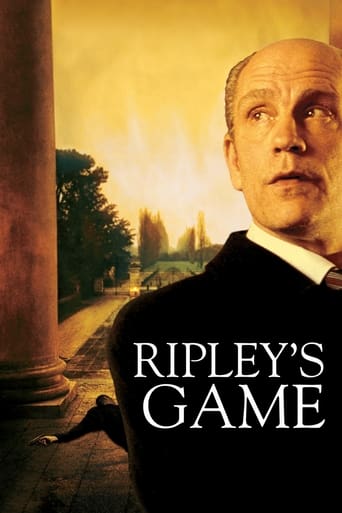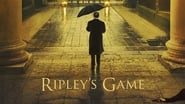Mike Roman
Any profound film, book, poem, reveals its essence in its paradox. Ripley's Game is no different. It is a paradox that plays out under the guise of an ordinary film. To this end, it is a film that is enveloped by its own protagonist-antagonist, the paradox of Tom Ripley, a Veneto-dwelling American, seemingly devoid of morals and feeling, yet with all the sensualism and erudition of an epicurean sybarite.Morricone's music, as impeccable as ever, opens the film in Berlin with a slow subtle score before embarking on the clavicembalo (harpsichord) and a beautiful aerial shot of Malkovich's little red fiat coursing through the hills of Treviso.Ripley's Game, based on Patricia Highsmith's novel about the amoral Tom Ripley and his exploits, is a fantastically underrated film which, due to its high-art European status (it was shot on location in Germany and Italy and concerns itself with art first and foremost), was largely passed over in favour of more exciting, and faster moving films. It was a huge financial flop (costing over $30m and recouping barely a tenth of that), and in spite of opening on the big screen in Europe, went straight to DVD in the states.The locations, notably Berlin and the Veneto, are part of the film's charms (dare I say characters in themselves) along with those of the triumvirate of Ripley (Malkovich), Reeves (Winstone), and Trevanny (Scott). The casting is marvellous here, and the three protagonists play off each other's strengths and weakness beautifully. From the very off, the uncouth philistine, Reeves (stoned and waxing as lyrically as he can of Berlin's architecture) aside the Renaissance man Ripley (calm and collected and slightly disgusted at Reeves' crassness), is an absolute joy to watch in its theatricality and Cavani's direction as they walk across the Gendarmenmarkt in Berlin's Mitte district with a view to pulling off a not-so-ambitious art heist.It's almost as fine a scene as one a little later where Winstone's character presents Ripley with a garrotte as they walk across another of Berlin's platz's. Here, we see Malkovich living up to his philosophy as he toys with the garrotte in plain sight as if it were a scarf. 'I don't worry about being caught' he says later on in a remarkable scene in a train station bathroom, 'because I don't believe anyone is watching.' It is this total lack of paranoia which manifests itself as a detached coolness, almost palpably terrible in its calmness, that Malkovich (avowedly a man that has never felt embarrassed) carries off so well in his quiet unruffled countenance. Of all the actors who have played Ripley in their various incarnations - Delon, Damon, Hopper, Pepper - Malkovich is by far the one whom Highsmith herself would have recommended for the role. Indeed, one wonders if it is Malkovich playing Ripley or Ripley playing Malkovich such is the quiet strength of his performance.The plot, though itself flawed, struggles a little here and there to tie (garrotte) things up, and leaves a couple of holes (emphatically, not made by bullets) here and there. But it is the plot's unconventionality, garrottes and pokers instead of guns, philosophy instead of mathematics, art instead of science, that makes the film so wonderfully watchable. It is certainly a film that, perhaps like Ripley should he ever get collared, deserves a fair trial.Ripley at one point calls himself a 'creation' and 'a gifted improviser' when Trevanny asks him who he is. Trevanny doesn't seem to understand. He has never dreamed, never improvised, he seems completely lacking in any spontaneity to the point of pathology. Perhaps this is what leukemia does to you (Trevanny we quickly learn is dying, which explains his succumbing to Ripley's outlandish deal), but perhaps not. The final scene has Trevanny in a moment of what can only be called total spontaneity, doing (or more significantly being) something that Ripley cannot himself understand. For a brief moment, and it shows on the lips of Trevanny, the roles have been switched. The master has become the protégé, the protégé become the master. It is a turnaround of some aplomb, as the circle closes and completes itself.Trevanny's name itself seems to have inspired (or have been inspired by - the timeline is a little muddy here) the airport paperback writer and American film scholar Rodney William Whitaker whose later book and bestseller Shibumi (1979) appears under the pseudonym Trevanian and has all the hallmarks of Ripley's presence, as the following quote illustrates: "Shibumi is understanding, rather than knowledge. Eloquent silence. In demeanour, it is modesty without pudency. In art, where the spirit of shibumi takes the form of sabi, it is elegant simplicity, articulate brevity. In philosophy, where shibumi emerges as wabi, it is spiritual tranquility that is not passive; it is being without the angst of becoming. And in the personality of a man, it is…. How does one say it? Authority without domination? Something like that…" It appears that Highsmith's Ripley had cause to inspire. 'All I know is that we're in a constant state of being born.' In this disclosure of Ripley's, again in the bathroom (is not the bathroom the place of revelations?), he perhaps divulges his own bodhisattva nature, not quite Buddha yet (whose birth has by his very (un)nature finished), but on the path. He doesn't quite know why he is helping Trevanny in the farcical train scene, but perhaps this is why: to lead Trevanny to his own awakening. This eventually accomplished, (nirvana comes to most at the point of death), Ripley can return to the music, to the clavicembalo which his mistress caresses so gently, and to the art of living which characterizes the one who has achieved what Whitaker later calls Shibumi. Yet, the question remains, and here is the paradox - that within Ripley's understanding and supposed enlightenment there is an obscurity. There is a darkness, and the angst of still being constantly born.
maaaaarcus
I'm amazed how many people on IMDb gave this film such good reviews. It completely lost me in the first scene where Tom Ripley is making the bogus deal with another dodgy art dealer and kills his bodyguard in very unconvincing form. Everything from how the film looks (choice of film stock) to the boring cinematography, choreography, hammy performances, and writing tells me I'm in for ... well, a bad film. And that's exactly what it is, folks!! Where this movie really lost me is when I discover Tom Ripley talking on a cell phone. Okay. That must mean it is set around the time the movie was made (early 2000's). If this is the same character as the Matt Damon one from The Talented Mr. Ripley which was set in the 1950's, that would make Tom Ripley in his 60's, at least!! I'm sorry, but Malcovich does not look like he's in his 60's. (Even though Malcovich has been sporting the old man haircut probably since he was three, this just doesn't cut it) And my apologies for my lack of knowledge on this Ripley character because I have never read the series, but isn't he supposed to be gay? That was certainly what The Talented Mr Ripley suggested. What I assume is that he's bi-sexual and that many years later he's decided to shack up with a much younger Italian woman who loves it from behind ... Pathetic!
mindcat
Although I thought early on this flick would be somewhat mindless, I was surprised to find a gem of insight into human character. Ripley, of course, is rich and without conscience so we could easily believe. What in fact Ripley's game really is I am unsure unless we could presume he is Satan in disguise.The psychological abduction of the young father who it was said had a fatal disease, could have been rewritten I think to make the good vs. evil underpinning and irony stronger. Indeed, what did the young man have to lose if his disease was fatal. I suppose one could say, to do as he did, allowing manipulation by Ripley to do great evil, underscores what many soldiers know, to kill once difficult, often and many easy.The plot seemed illogical at times and rushed towards the end. Do you really think, will all these dead bodies, some have baked story about a robbery would explain her dead husband and the German Moffia thugs?The contrast between who Ripley was objectively, a deceptive murderer and thug verses the refined music lover and cultured swine, cannot be over looked.Murder is murder and blood is blood after all.The flick left me pondering some of the more dicey parts of human existence, despite its short comings.








